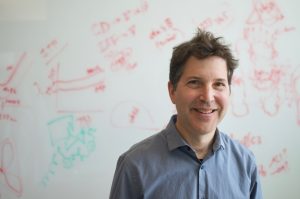
Speaker: David Baker, Ph.D.
Professor
Biochemistry
University of Washington
Date: Thursday, March 18, 2021
Time: 3:00-4:00 PM EDT
Zoom – check email for link or contact ksas@seas.upenn.edu
Title: “The Coming of Age of De Novo Protein Design”
This seminar is jointly hosted by the Department of Bioengineering and the Department of Biochemistry & Biophysics.
Abstract:
Proteins mediate the critical processes of life and beautifully solve the challenges faced during the evolution of modern organisms. Our goal is to design a new generation of proteins that address current day problems not faced during evolution. In contrast to traditional protein engineering efforts, which have focused on modifying naturally occurring proteins, we design new proteins from scratch based on Anfinsen’s principle that proteins fold to their global free energy minimum. We compute amino acid sequences predicted to fold into proteins with new structures and functions, produce synthetic genes encoding these sequences, and characterize them experimentally. I will describe the de novo design of fluorescent proteins, membrane penetrating macrocycles, transmembrane protein channels, allosteric proteins that carry out logic operations, and self-assembling nanomaterials and polyhedra. I will also discuss the application of these methods to COVID-19 challenges.
Bio:
David Baker is the director of the Institute for Protein Design, a Howard Hughes Medical Institute Investigator, a professor of biochemistry and an adjunct professor of genome sciences, bioengineering, chemical engineering, computer science, and physics at the University of Washington. His research group is a world leader in protein design and protein structure prediction. He received his Ph.D. in biochemistry with Randy Schekman at the University of California, Berkeley, and did postdoctoral work in biophysics with David Agard at UCSF. Dr. Baker is a member of the National Academy of Sciences and the American Academy of Arts and Sciences. Dr. Baker is a recipient of the Breakthrough Prize in Life Sciences, Irving Sigal and Hans Neurath awards from the Protein Society, the Overton Prize from the ISCB, the Feynman Prize from the Foresight Institute, the AAAS Newcomb Cleveland Prize, the Sackler prize in biophysics, and the Centenary Award from the Biochemical society. He has also received awards from the National Science Foundation, the Beckman Foundation, and the Packard Foundation. Dr. Baker has published over 500 research papers, been granted over 100 patents, and co-founded 11 companies. Seventy-five of his mentees have gone on to independent faculty positions.
